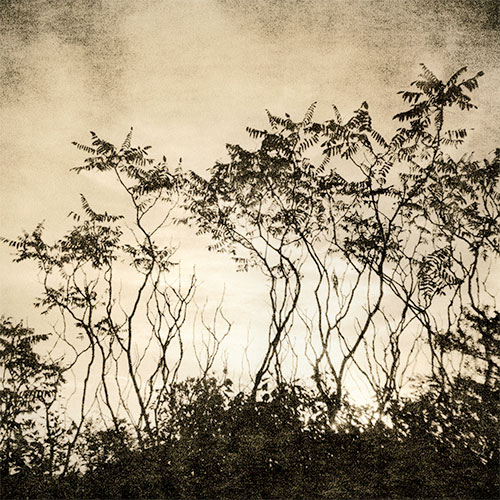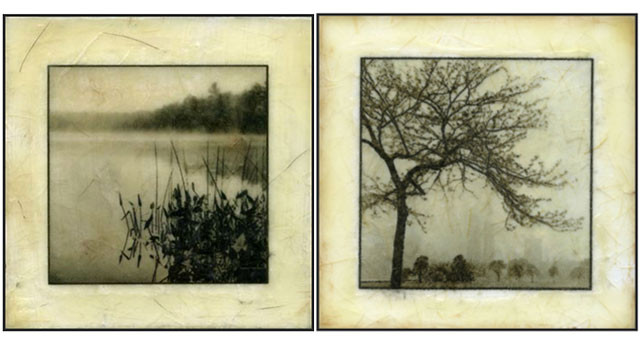Vicki Reed is a fine art photographer based out of Cedarburg, Wisconsin who is fascinated by a wide variety of photographic processes. Keep reading to find out how her time as a photojournalist has affected her personal work and what new processes have her excited.
How did you get started?
After I helped my husband get through graduate school, we settled in Evansville, Indiana. I had received my bachelor's degree in Psychology in Maine decided that I couldn't do much in that field without having a graduate degree. However, before pursuing a graduate degree I wanted to try something hands on. There was a great two year commercial/industrial photography program at the Indiana Vocational Technical Institute in Evansville. I enrolled in the photography course and was hooked after I developed my first roll of film and saw my first print appear in the tray like magic. I knew I had found what I wanted to do for the rest of my life. I didn't know what I would do with it at the time, but it felt good to have a voice.
Did you have a background in art before that?
We didn't have a strong art program at the high school in the small town in central Maine where I grew up, but I did take oil painting classes from a local artist. Learning about color theory and creating a color palette certainly helped when I began my hand-coloring work.
It was the best training I've had concerning photography. I never knew from one day to the next what I would be photographing.
You worked at a newspaper for a number of years. Tell me about that.
It was the best training I've had concerning photography. I never knew from one day to the next what I would be photographing. I had to quickly assess a breaking news scene when I arrived, finding what would be the best approach to get the one photograph that would convey the story to the readers.
Also, we didn't have much control over lighting when out in the field. This often produced difficult negatives to print, but it was the best practical darkroom experience I have ever had. I often traveled with a roll of aluminum foil and a big white mat board in the back of my car so I could use it for fill lighting. As long as it wasn't a crisis situation I could usually nab someone nearby to hold it for me.
You've been an editor for an art magazine as well.
My husband, Buz, and I started a literary art magazine. His background is in writing, so our interests mesh together well. We moved to Galesburg, IL where we formed a group of writers, musicians, artists. We got together twice a month to present programs and share work. Out of that grew a magazine that Buz and I published. That magazine was eventually taken over by a local college.
When we moved to Wisconsin we discussed our previous experience with a group of friends, who convinced us to start a new magazine, Porcupine. We featured interviews with artists, published short fiction, poetry, and essays as well as portfolios of artwork. People submitted work from all over the world. I was in charge of the art and essays as well as the financial side of the publication. We published it for 12 years.
My favorite part of working at the newspaper had been the feature stories. I accompanied the reporter and tried to be invisible to capture candid images of the person he or she was interviewing. Not only was I discovering people through the lens of my camera, but I was hearing the interviewer ask questions and the responses. I was fascinated by all the people I met that way. Porcupine provided another way to meet some interesting people and learn about their processes, which I've always been intrigued by. And that includes anyone in the arts, not just photographers. We met people from all over the world, some of whom have become close friends. It was a wonderful experience.
Not only did it help me to mature in my own field over the years, but it exposed me to other artists and made me aware of what they're experimenting with.
How has working for the newspaper and starting your own magazine affected your personal work?
Not only did it help me to mature in my own field over the years, but it exposed me to other artists and made me aware of what they're experimenting with. It enriched my own work and gave me permission to explore new things, especially when people are breaking ground in their particular field.
Beyond the technical skills of working in the darkroom at the newspaper, it also honed my eye. I worked at a daily newspaper in Central Illinois where there wasn't a lot of breaking news happening. Being in such a quiet community, I had to be constantly looking for something interesting that could be the front page of the paper. It forced me to be creative with everyday images and see everyday things in a way that might interest a viewer. If the most exciting thing going on was the corn growing in the fields I had to figure out an interesting way to photograph it- which might mean digging a hole in the field to crawl in to photograph the combines working at dirt level.
I gravitate toward simplicity and quiet moments and stillness.
How would you describe your photography?
I gravitate toward simplicity and quiet moments and stillness. That's what I try to capture, no matter what it is-water, landscapes, people. I always try to capture quiet moments.
What draws you to nature as a subject source?
I grew up in a small town near a lake. A lot of my childhood memories were playing with friends in fields. We'd get up on summer mornings and take off for the day. We'd end up at somebody's house for lunch and at seven o' clock a fire whistle blew that resonated throughout the town, indicating that it was time for us to go home. All the time in between was free to us. We'd explore the lake and ponds, catch frogs and turtles. It instilled in me a love for nature.
My job at the newspaper could be very hectic and stressful. I find the quietness in nature has become the antidote to the stress caused by busyness. It provides a wonderful escape.
Landscapes are an endless source: they change during seasons, different weather patterns; the light is never the same even over the course of an hour. You have to be in tune with what's going and how the light changes. I find it absolutely essential to be aware of my surroundings.


